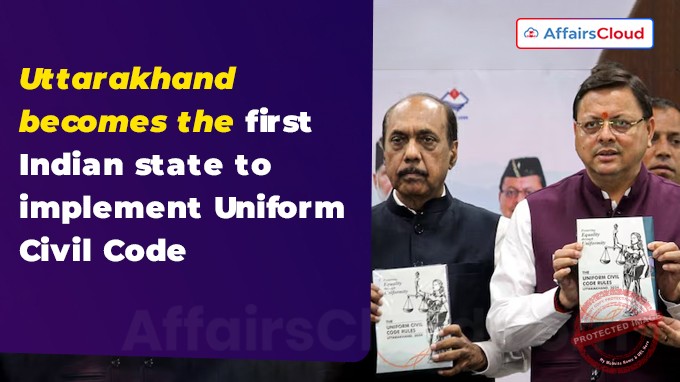 Uttarakhand has become the 1st state in India to implement the Uniform Civil Code(UCC), which came into effect on 27 January 2025. Uttarakhand Chief Minister(CM) Pushkar Singh Dhami launched the UCC portal and issued a notification marking the adoption of the civil code at an event in Dehradun, Uttarakhand.
Uttarakhand has become the 1st state in India to implement the Uniform Civil Code(UCC), which came into effect on 27 January 2025. Uttarakhand Chief Minister(CM) Pushkar Singh Dhami launched the UCC portal and issued a notification marking the adoption of the civil code at an event in Dehradun, Uttarakhand.
- The UCC aims to unify personal laws related to marriage, divorce, succession, and inheritance, ensuring equality for all citizens, excluding those from Scheduled Tribes (ST).
Background:
i.On February 7, 2024, the Legislative Assembly of the state of Uttarakhand passed the Uniform Civil Code (UCC) Bill.
ii.On March 13, the bill was granted assent by President Droupadi Murmu to establish a uniform and equal set of rules on personal status law, including marriage, divorce, succession, and inheritance, that applies to all citizens of the state irrespective of religion.
iii. The Uttarakhand government introduced the Uttarakhand Uniform Civil Code Act, 2024, which provides a clear process for creating and canceling wills and related documents called codicils under the rules of inheritance.
iv.This law applies throughout the state of Uttarakhand and is also effective on the residents of the state living outside Uttarakhand.
About UCC:
i.The UCC is a proposed framework aimed at creating a set of personal laws that apply equally to all citizens, regardless of their religious beliefs.
ii.At present, personal laws related to marriage, divorce, inheritance, adoption, and maintenance are governed by the religious customs and scriptures of different communities.
Features of the UCC:
The bill is divided into four parts: Part 1:Marriage and Divorce, Part 2: Succession, Part 3: Live-In Relationship, and Part 4: Miscellaneous. Each part is subdivided further into chapters. Some of the major features are as follows:
- Section 4 addresses conditions of marriage, one of which is that “neither party has a spouse living at the time of the marriage,” and requires a marriage age of 21 for a man and 18 for a woman effectively abolishing polygamy and child marriage. The code also requires compulsory registration of marriages within 60 days.
- Under section 25, both parties are granted an equal right to petition the court to dissolve the marriage through a decree of divorce, and divorce can occur only through court proceedings.
- Section 29 emphasizes that marriages can be dissolved only under the provisions of the code, “notwithstanding any usage, custom, tradition, [or] personal law of any party to the marriage.”
ii.Registration Process: Sub-registrar must make a decision on marriage registration within 15 days of receiving an application.
- Marriages must be registered within 60 days of solemnization.
- Marriages conducted before March 26, 2010, or outside Uttarakhand, can be registered within 6 months of the Act’s implementation, if they meet legal criteria.
Key Points:
i.Article 44 of the Indian Constitution advocates for the implementation of a Uniform Civil Code (UCC) across India.
ii.Directive Principles of State Policy (DPSP): UCC is part of the DPSP Part IV (Articles 36–51), which guides the government in formulating policies.
iii.DPSPs are not legally enforceable by courts (Article 37), meaning the government is expected to work toward them but is not legally bound to implement them immediately.
Note: Currently, Goa remains the only state in India with an existing civil code, introduced during the Portuguese colonial period.
About Uttarakhand:
Chief Minister (CM)– Pushkar Singh Dhami
Governor- Gurmit Singh
Capital- Dehradun
Dams- Tehri Dam, Tumaria Dam, Maneri Dam




